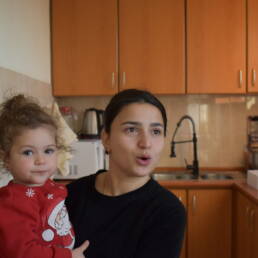Humanitarian advocacy
Raising the voice of those most in need
Humanitarian crises are increasing both in terms of quantity and complexity, with natural and climate change related disasters occurring simultaneously with man-made disasters.
Crises are also becoming more often protracted and easily forgotten by the media and donors, making it difficult to meet the essential needs of the affected people.
Increasingly, politics and security aspects interfere with the delivery of humanitarian aid. The growing reliance on sanctions as a foreign policy tool has had a detrimental impact on the ability of humanitarian organisations to do their work in sanctioned countries. Additionally, humanitarian workers are facing more instances of violence and limited access to crisis situations.
These aspects threaten the humanitarian principles of independence, neutrality, humanity and impartiality and International Humanitarian Law
.
The growing humanitarian funding gap threatens the appropriate and sustainable delivery of assistance to people in need.
The European Commission and EU Member States together are by far the biggest humanitarian donor globally. Yet, the levels of funding are decreasing, which, together with the increasingly protracted nature of humanitarian crises, is leaving the EU and the wider humanitarian system unable to deliver assistance appropriately.
The lack of sufficient funding is also a significant challenge to the ability of humanitarian organisations to provide a quick and consistent response. In addition, the lack of recognition of the role of local organisations and affected communities in the humanitarian response undermines their autonomy and local knowledge.
Caritas Europa wants to strengthen the link between policy and practice, enabling a continuous dialogue between Caritas organisations and the concerned European institutions.
Caritas Europa remains determined to provide consistent, comprehensive and effective humanitarian assistance in order to save lives and restore dignity to people living in the most vulnerable situations. This encompasses advocacy efforts both within our confederation and towards international actors on localisation, the humanitarian-development-peace nexus, preservation of humanitarian space and other relevant topics. Our focus is on reinforcing the involvement of local partners in humanitarian aid as declared in the Grand Bargain, the main outcome of the first World Humanitarian Summit of 2016.
Our members are engaged in humanitarian response both in Europe and abroad, primarily through local Caritas and non-Caritas partners. They provide immediate life-saving assistance to people affected by crises. In the longer term, they provide services to support social cohesion and the rebuilding of livelihoods, often bringing together these elements in what is called the humanitarian-development-peace nexus. Strengthening the capacity of local actors to take the lead on humanitarian assistance is an important aspect of the work of Caritas Europa and our members.
We actively liaise with the European Commission’s Humanitarian Aid and Civil Protection department (DG ECHO) as the European Union’s technical provider for humanitarian aid. When it comes to ECHO funding, we want to be sure that Caritas is perceived as it is: a strong family providing substantial support to people affected by both small and large, visible and forgotten crises worldwide. We also want to be sure that ECHO maintains a diverse set of partners, such as Caritas organisations in Europe, which have long lasting partnerships with grassroots organisations in different areas of the world and which hold specific sectoral expertise.
We also collaborate closely with VOICE (Voluntary Organisations in Cooperation in Emergencies – the main NGO interlocutor with the EU on emergency aid) in order to highlight the importance of joining capacities and voices on the humanitarian-development nexus and resilience and disaster risk reduction, amongst others.
Ask an expert
Abriel Shieffelers
Humanitarian Advocacy Officer
Tel: +32 (0)2 204 03 81
Mob: +32 (0)465 45 88 04
aschieffelers@caritas.eu




